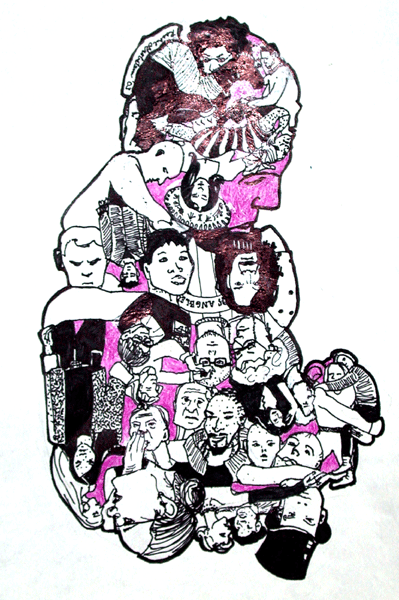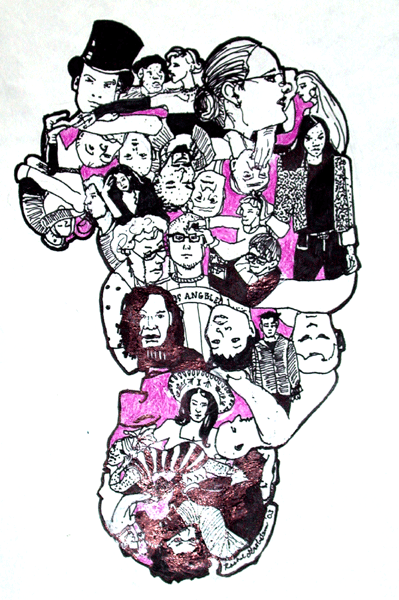Made available on Serendip
In association with Making Sense of Diversity: An Exploration, a world wide conversation

|
February 17 , 2006
Claudia Ginanni, Carla Shedd
Are You What You Do? Occupation, Identity and Group Loyalty
Participants
Summary
Prepared by Vanessa Christman
Additions, revisions, extensions are encouraged
in the On-Line Forum
| 
|
The facilitators do their job by starting off.
Claudia Ginanni, Web content manager in Public Affairs, began by remarking that she thinks the question “Are you what you do?” has a link to class, because for most people what you do is tied to income. What you do can also conflict with other's expectations, for example an urban African-American male may have a certain perception or expectation of a police officer. Claudia then shared a story of employment and identity from her life:
At one point I worked in a restaurant—waiting tables and tending bar full time. This had a significant impact on me. Especially if you work at night, it can be isolating. I stopped that work, moved back to Philadelphia and began a career as a journalist. Once when I went out to dinner with friends, our reservation had been given to another group, and we had to wait a long while. While waiting at the bar, my friends started saying, “We wouldn't be getting this treatment if we were men, or a mixed party.” (They were all women and all lesbians). My background in restaurant work gave me empathy for the hostess; I knew how tough it can be to seat people. My identity as a friend and as a lesbian was in conflict with my identity as a former restaurant worker.
Michelle Kasza, a McBride student, explained that before coming to Bryn Mawr she worked as physician recruiter. She quit that job to take care of her ill grandmother. Now that she has returned to school, she is not making money, no longer owns a home, no longer entertains, no longer buys great gifts, and is no longer available for her family. They have some problems with this. “But I feel I'm being true to myself,” she commented.
Emelin Gasparrini is a student and student coordinator for Dining Services (DS). “It can be conflicting,” she said. Not only is she a liaison, but she's an administrator herself. “My boss tells me to switch between my administrator cap and my student cap.”
Carla Shedd, a Mellon Pre-doc teaching “Race and Place in Urban America,” wanted to be a Supreme Court justice, but later thought it would be better to approach these issues as a teacher rather than a justice. She still hopes to affect (and effect?) policy that way.
Change of shift.
Anne Dalke raised a question for everyone: Are the conflicts you sense inside you, or do they come from the outside? She shared an anecdote about being a secretary and how that was not reconcilable for a professor who knew her as a star student. She herself felt fine with the position.
Michelle replied that she's at peace; it's her family that is stressed (though proud)—“They're very conflicted about me being an adult learner.”
Claudia revealed that in addition to working now in Public Affairs, she has waited tables and worked in a factory and has been a museum worker, receptionist and fire eater (!)—all of those different occupations have assumptions about them. For her, it could have been a conflict at first to work in PR, having been a journalist, because of assumptions that PR people “just write lies.” Some jobs are seen as temporary when they're not: when she waitressed across from a theater, she was asked “What are you really, though?”
Annabella Wood stated that she feels it's absolutely false that we are what we do. She went from prep school student to truck driver. But I knew I was not just a truck driver—I was so many other things.”
Chris MacDonald-Dennis shared Claudia's earlier supposition that it's a class thing: for working class people, their job is their job, and they don't identify with it. People identify with a career. You can leave (and often look forward to leaving) your job at the end of the day vs. having a career, you get enrichment and fulfillment from work. Class mobility makes understanding the difference from one generation to another a challenge.
Sometimes forms—such as standardized testing forms, as Aheli Purkayastha said, make you choose an identity. And sometimes the form or others tell you, “You can't be that. . . .”
Does urbanization divorce us from jobs in which creating and growing are part of our identity? Farmers identify as farmers—it's not just a job for them.
Some people fear that you can go backwards in your income, back to where earlier generations were, especially if you leave your job to study.
Leighona Curry started as a temp at BMC, then worked in employment. Then she took on student employment. She got to see how her job had an impact on everyone else's job. Now she works in payroll—at first it was scary to be responsible for others' money. “Once I even forgot to do my own pay, I was so worried about getting students' pay.” Being here, she sometimes has thoughts about attending college, which she did not do after high school. “But I will be older. What career do I want when I'm 60? Do I want to be working when I'm 60? On the other hand, now, am I someone who just puts numbers in the system? I enjoy it now, but sometimes I still wonder if it's a career.”
Are you being served?
People asked Emelin about the student DS staff. How do they identify with that job? Emelin came to BMC having worked at a fast food place for two summers. Because of that experience, she resisted working in DS. But it was required of all freshmen working on campus, and she only had to work 8 hours a week—much less than summer work.
She sees the problem coming from students who have never had a job before. Emelin sees manual labor as a time to let her brain rest. (Then she can go write a paper afterwards.) Definitely students feel they're above DS work. And the conflict between non-working students and students working in the dining hall is tough. Friends treat you differently when you're working there than when you're not working. When asked how she dealt with that, Emelin said she didn't let them ignore her when she was working. At least people who worked there a year understand the complexities at DS.
Sasha Toten is a sophomore who worked in DS last year. She had heard good things about working at DS. She had a respect for those who did it every day, and for the product—good, fresh food.
Not just in DS, but all over BMC there is the perception that students are here “to be served” by faculty and staff.
Are you what you do?
As Michelle pointed out with an example from her mother's life, retirement can be very difficult for those whose identities are really wrapped up in their job.
Anne remarked that occupation is the first tag we reveal. At parties, we don't ask, “Are you sensitive and open to the universe?” We ask, “What do you do?”
Laura Blankenship shared that she was first part of the Bryn Mawr community as a faculty spouse, then as a staff member. Some people don't know the other side to her. For some, it's as if they're saying, “I identified you this way, and now I have to deal with you this way, and I'm not comfortable with that.”
Someone asked if Laura doesn't put others in box because she's had so many roles.
Even the role of a student can be varied. One “student on a mission”—Christina Gubitosa—said she is here as a future provider. “I'm not just here for myself. There's a class element. My purpose for being a student is different from that of many others.” Emelin feels that tension too.
Anne remarked that professors may make assumptions about why students are here—for example, that students are there because they just want to learn about 19 th century American literature!
Chris hears from many 1 st generation students that they share Christine's feeling of being here on a mission. There's a perception that students aren't supposed to be ambitious. As one student pointed out, those who know they're gonna “make it” regardless of their efforts and grades don't need to seem ambitious. Others need to get every single thing they can get.
Annabella, a McBride who was considered a leader in her community came here expecting a continuation of that philosophy. But she feels some professors think students are just supposed to take in material, not question. The student/professor role can be especially hard if you're an older student.
Laura observed that there's a difference among staff too. Some care about making the environment here better for those who work here; others say, “Just give me my paycheck” and get out of here.
Who are you if you're no longer doing what you did?
Jody Cohen ran into a former McBride student of hers, and the two started talking about topics beyond the classes the student had been in. A former student wrote to her that it was exciting that now (after the BMC environment) they can have a relationship.
| Return to Schedule for Friday Noon Conversations

| Bryn Mawr Conversations
| Archived
Forum
| Archive of Bryn Mawr Conversation
| General Conversation
| Serendip Home |
These pages are sponsored by the Bryn Mawr College Office
of Intercultural Affairs, the Center for Science and Society and the Serendip
website. Send us additional comments or suggestions at Serendip
© by Serendip 1994-
- Last Modified:
Wednesday, 21-June-2005 15:18:00 EST

